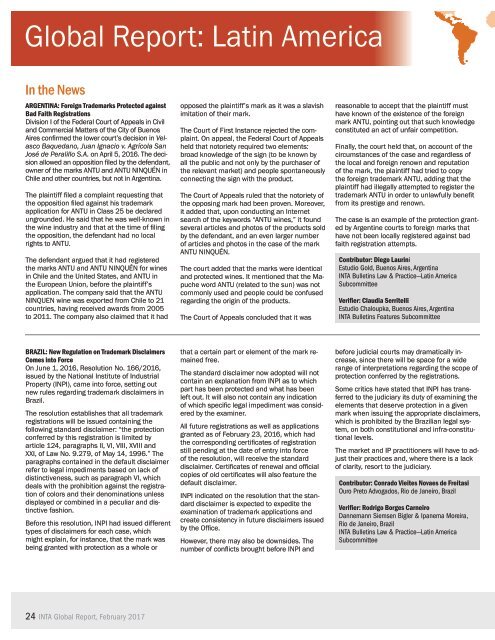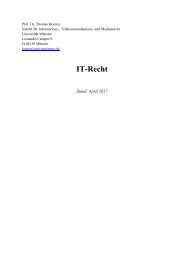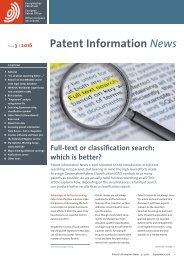GlobalReport
QqMg309yB9H
QqMg309yB9H
Create successful ePaper yourself
Turn your PDF publications into a flip-book with our unique Google optimized e-Paper software.
Global Report: Latin America<br />
In the News<br />
ARGENTINA: Foreign Trademarks Protected against<br />
Bad Faith Registrations<br />
Division I of the Federal Court of Appeals in Civil<br />
and Commercial Matters of the City of Buenos<br />
Aires confirmed the lower court’s decision in Velasco<br />
Baquedano, Juan Ignacio v. Agrícola San<br />
José de Peralillo S.A. on April 5, 2016. The decision<br />
allowed an opposition filed by the defendant,<br />
owner of the marks ANTU and ANTU NINQUÉN in<br />
Chile and other countries, but not in Argentina.<br />
The plaintiff filed a complaint requesting that<br />
the opposition filed against his trademark<br />
application for ANTU in Class 25 be declared<br />
ungrounded. He said that he was well-known in<br />
the wine industry and that at the time of filing<br />
the opposition, the defendant had no local<br />
rights to ANTU.<br />
The defendant argued that it had registered<br />
the marks ANTU and ANTU NINQUÉN for wines<br />
in Chile and the United States, and ANTU in<br />
the European Union, before the plaintiff’s<br />
application. The company said that the ANTU<br />
NINQUEN wine was exported from Chile to 21<br />
countries, having received awards from 2005<br />
to 2011. The company also claimed that it had<br />
opposed the plaintiff’s mark as it was a slavish<br />
imitation of their mark.<br />
The Court of First Instance rejected the complaint.<br />
On appeal, the Federal Court of Appeals<br />
held that notoriety required two elements:<br />
broad knowledge of the sign (to be known by<br />
all the public and not only by the purchaser of<br />
the relevant market) and people spontaneously<br />
connecting the sign with the product.<br />
The Court of Appeals ruled that the notoriety of<br />
the opposing mark had been proven. Moreover,<br />
it added that, upon conducting an Internet<br />
search of the keywords “ANTU wines,” it found<br />
several articles and photos of the products sold<br />
by the defendant, and an even larger number<br />
of articles and photos in the case of the mark<br />
ANTU NINQUÉN.<br />
The court added that the marks were identical<br />
and protected wines. It mentioned that the Mapuche<br />
word ANTU (related to the sun) was not<br />
commonly used and people could be confused<br />
regarding the origin of the products.<br />
The Court of Appeals concluded that it was<br />
reasonable to accept that the plaintiff must<br />
have known of the existence of the foreign<br />
mark ANTU, pointing out that such knowledge<br />
constituted an act of unfair competition.<br />
Finally, the court held that, on account of the<br />
circumstances of the case and regardless of<br />
the local and foreign renown and reputation<br />
of the mark, the plaintiff had tried to copy<br />
the foreign trademark ANTU, adding that the<br />
plaintiff had illegally attempted to register the<br />
trademark ANTU in order to unlawfully benefit<br />
from its prestige and renown.<br />
The case is an example of the protection granted<br />
by Argentine courts to foreign marks that<br />
have not been locally registered against bad<br />
faith registration attempts.<br />
Contributor: Diego Laurini<br />
Estudio Gold, Buenos Aires, Argentina<br />
INTA Bulletins Law & Practice—Latin America<br />
Subcommittee<br />
Verifier: Claudia Serritelli<br />
Estudio Chaloupka, Buenos Aires, Argentina<br />
INTA Bulletins Features Subcommittee<br />
BRAZIL: New Regulation on Trademark Disclaimers<br />
Comes into Force<br />
On June 1, 2016, Resolution No. 166/2016,<br />
issued by the National Institute of Industrial<br />
Property (INPI), came into force, setting out<br />
new rules regarding trademark disclaimers in<br />
Brazil.<br />
The resolution establishes that all trademark<br />
registrations will be issued containing the<br />
following standard disclaimer: “the protection<br />
conferred by this registration is limited by<br />
article 124, paragraphs II, VI, VIII, XVIII and<br />
XXI, of Law No. 9.279, of May 14, 1996.” The<br />
paragraphs contained in the default disclaimer<br />
refer to legal impediments based on lack of<br />
distinctiveness, such as paragraph VI, which<br />
deals with the prohibition against the registration<br />
of colors and their denominations unless<br />
displayed or combined in a peculiar and distinctive<br />
fashion.<br />
Before this resolution, INPI had issued different<br />
types of disclaimers for each case, which<br />
might explain, for instance, that the mark was<br />
being granted with protection as a whole or<br />
that a certain part or element of the mark remained<br />
free.<br />
The standard disclaimer now adopted will not<br />
contain an explanation from INPI as to which<br />
part has been protected and what has been<br />
left out. It will also not contain any indication<br />
of which specific legal impediment was considered<br />
by the examiner.<br />
All future registrations as well as applications<br />
granted as of February 23, 2016, which had<br />
the corresponding certificates of registration<br />
still pending at the date of entry into force<br />
of the resolution, will receive the standard<br />
disclaimer. Certificates of renewal and official<br />
copies of old certificates will also feature the<br />
default disclaimer.<br />
INPI indicated on the resolution that the standard<br />
disclaimer is expected to expedite the<br />
examination of trademark applications and<br />
create consistency in future disclaimers issued<br />
by the Office.<br />
However, there may also be downsides. The<br />
number of conflicts brought before INPI and<br />
before judicial courts may dramatically increase,<br />
since there will be space for a wide<br />
range of interpretations regarding the scope of<br />
protection conferred by the registrations.<br />
Some critics have stated that INPI has transferred<br />
to the judiciary its duty of examining the<br />
elements that deserve protection in a given<br />
mark when issuing the appropriate disclaimers,<br />
which is prohibited by the Brazilian legal system,<br />
on both constitutional and infra-constitutional<br />
levels.<br />
The market and IP practitioners will have to adjust<br />
their practices and, where there is a lack<br />
of clarity, resort to the judiciary.<br />
Contributor: Conrado Vieites Novaes de Freitasi<br />
Ouro Preto Advogados, Rio de Janeiro, Brazil<br />
Verifier: Rodrigo Borges Carneiro<br />
Dannemann Siemsen Bigler & Ipanema Moreira,<br />
Rio de Janeiro, Brazil<br />
INTA Bulletins Law & Practice—Latin America<br />
Subcommittee<br />
24 INTA Global Report, February 2017





